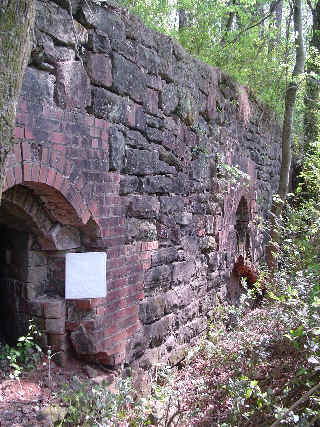Eureka Coke Ovens
This image is from Peele's Mining Engineers Handbook, 1918, in the author's library. Peele indicates that beehive ovens were "probably used in Europe since 1750. Design brought to U.S., 1825. A 2-oven plant was built in Fayette. Co., Pa. 1841." "Design and dimensions of bee-hive ovens in U.S. are practically standardized, though ovens of different sizes still exist in many plants." This is a bee-hive oven "for hand drawing" meaning that the hot coke would be pulled from the oven by hand, using long iron bars, hooks and rakes. For more graphic detail on this see the Newcastle section of Birmingham Rails. The lower image indicates the plan (top view) and elevation (front view) of a typical oven. Although the ovens are round dome shapes they are arranged within a rectangular "battery" made with thick stone walls. Note that the spacing of the ovens is shown as 14'-6" which is very close to that found at Eureka. Other ovens in the Birmingham District that date slightly later in time match these images very well -- the ovens at Mary Lee Mine (Lewisburg No. 1, Fultondale, AL) are a very good match in terms of the details at the doors with the stone and brickwork surrounds and arches, shown below, photo by Birmingham Rails. |
 |
 |
|
 |